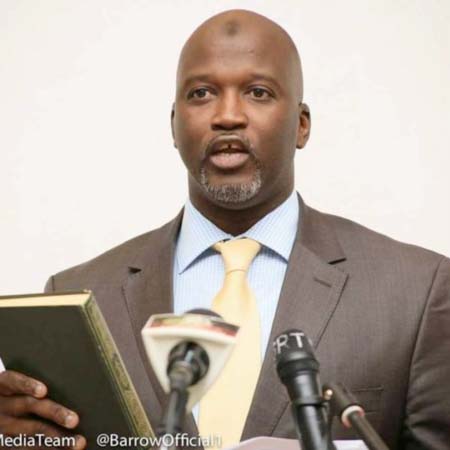
Justice
Minister Aboubacarr Tambedou has said the government dissolved the notorious
NIA for its arbitrariness and abuse of power, in a bid to restore the rule of
law and to put an end to impunity.
The
Justice minister’s speech was read on his behalf by Isatou Alwar Graham, deputy
Solicitor General, on Tuesday during the Chief Justice’s meeting with the
judiciary staff and the Bar Association members.
He
said the government of The Gambia driven by the desire to set in motion the
access to justice system, with renewed commitment for bold and competent
reforms for contracting and promoting, protecting fundamental human rights, has
to that effect dissolved the notorious NIA for its “arbitrariness and abuse of
power” in a bid to restore the rule of law and to put an end to impunity.
Tambedou
added that the key concerns in this reform are to ensure protection for those
vulnerable in accessing justice namely, arrested persons, detainees awaiting
trial and those convicted.
He
spoke of the structural and root causes of this vulnerable group and of police
brutality, a partial judiciary system, interference of the executive, and
non-adherence to the rule of law.
Justice
Minister Tambedou said given expectations on the newly elected government of
President Barrow, there is pre-occupation to accentuate and reinforce greater
constitutional democracy, which underscores parallel institutional benchmarks
that guarantee non-recurrence of lawlessness, arbitrariness, and repressive government
and laws.
“It
is evident that this new government realizes the urgent need for constitutional
reforms, and the need to adopt strategies to make the protection of fundamental
human rights more attainable.”
He
further stated that the bridging of institutional foundation for the expansion
of social justice system for all entails the recognition of rights of accused
in criminal trials, and that they have the right to be tried without undue
delay as justice delayed is justice denied.
Tambedou
said the right to receive compensation in the event of miscarriage of justice
should be promoted as well.
Persons
deprived of their liberty on whatever grounds have the right to a habeas
corpus, and then their detention is reviewed regularly before the courts, he went
on.
“The
need also to establish human rights units in regional police stations, and duty
posts could not be understated.”
He
added: “The independence of the judiciary means that judges in deciding cases
cannot act according to their own personal preferences or dictates of the
executive. This will result to arbitrariness and the culture of impunity.”
He
said the principle of independent judiciary has its origins in the theory of
separation of powers, whereby the three separate branches of government namely,
executive, legislature and judiciary, constitute a system of checks and
balances aimed at preventing abuses of power.
It
also is evident that only an independent judiciary is able to render justice
impartially on the basis of law, thereby also protecting human rights and
fundamental freedoms of the individuals.
Moreover,
he added, the tenure of judges should be guaranteed up to the mandatory
retirement age or the expiry terms of office, and then any decisions on
disciplinary actions, suspension or the removal of a judge should be subject to
an independent review.



